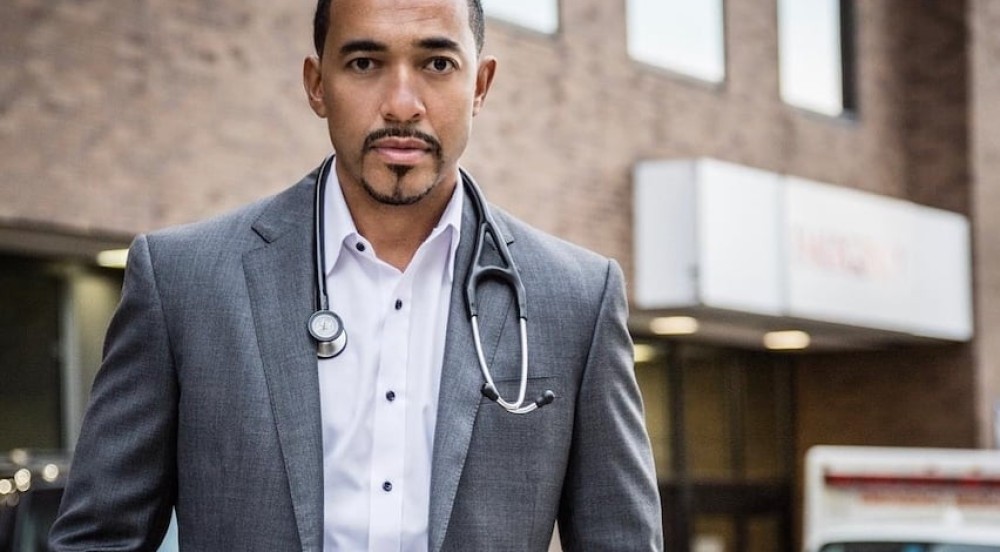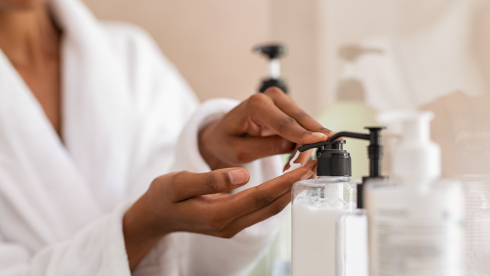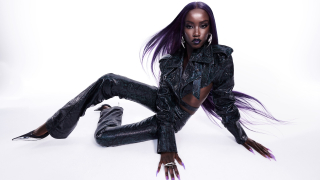By March 2020, New Jersey doctor Sampson Davis had spent just about two decades attending to patients in predominantly Black and Brown communities. But even at his level of experience, little could have prepared him for the onslaught of sufferers that would await him as a frontline worker when the COVID-19 pandemic hit. At that time, New York and New Jersey led the country in infection and death rates. By April, his brother had joined the number of men and women who lost their lives to what was then, an unfamiliar virus.
Though it’s been more than a year and a half since COVID first made landfall on American soil, the fight to save lives continues on. And for Davis, whose work is centered in the community, that work includes encouraging men and women who look like him, to step up and get vaccinated.
“The best course of motivation is action,” Davis tells EBONY. As a medical professional, he qualified for the vaccine earlier this year and was quick to receive the treatment that has proven to help stave off life-threatening effects from the virus. His decision to get vaccinated 7 months ago helped encourage his loved ones to follow suit. He also hopes that by opening clinics in New York, New Jersey and Miami, he can help others in the Black community see that it’s okay to take this preventative measure.
A 2018 Stanford University study found that Black men seen by Black doctors were more inclined to agree to life-saving, preventive services. Ongoing research has also found that biases within the medical field make Black patients more apt to receive better care from Black physicians. Yet, the number of Blacks pursuing a medical school education has decreased since the late 70s. That hard truth is concerning at any time, but during an ongoing health crisis, the circumstances feel more dire.
Twenty-plus years ago Dr. Davis, along with two other friends, became role models (Oprah’s words) for children across the nation. That he was able to go from the inner-city of Newark, New Jersey to med school, juvenile detention to celebrated physician, offered young people a symbol of hope and success for those who never dared to dream beyond their surroundings. And while he made “The Pact” to aspire to more with his childhood schoolmates, he’s since made a promise to the community to bring more Black doctors into the fold.
As a medical television personality, he is regularly seen on widely-watched programs touting this message. And in the face of the Delta variant, that message has new meaning. Davis says that overall, and in general, Black communities have it the worst when it comes to the uptick of the virus and the risk of impact because of commonly found medical issues like high blood pressure, diabetes, obesity and heart disease. In addition, our jobs, and living situations increase the possibility of contracting the virus and spreading it to loved ones. He also adds that comparatively our community is under vaccinated. “So the combination of all factors or what we called social determinants of health puts the Black community at greater risk of not only contracting the virus but dying from it,” Davis says.
While the author and renowned speaker understands that historical factors do play a part in the mistrust of Black people toward the medical field, he is adamant that our community must be involved with treatment plans and vaccination. “If I see my best friend getting the vaccine, then maybe I will get the vaccine. If I see my beautician getting the vaccine, then maybe I will get it. If I see my pastor receiving the vaccine, then maybe I would get it,” says Davis. “There is power in camaraderie and community. We have to be the voice of reasoning and galvanizing our community to get vaccinated. The virus kills; the vaccine saves lives. No question.”
With the holidays approaching, Davis says it’s high-time to get jabbed. Thanksgiving and Christmas are a great opportunity to enjoy loved ones, “but at the same time we’re putting each other at risk if unvaccinated,” Davis warns. The United States has yet to reach the herd immunity it had hoped for in the early stages of the vaccine and breakthrough COVID cases as a result of virus mutations seem to be more common. Davis asserts that it’s because “the virus wants to survive and live, so it will mutate. That is why the Delta variant is present and other variants will unfortunately occur.” Herd immunity would allow people to feel more protected, and as he explains it, “would make it so that even if an individual is not vaccinated amongst a larger group of vaccinated people, that individual would benefit from the vaccinated group antibodies and is indirectly protected somewhat from the virus.”
According to Davis and other medical professionals, herd immunity will be key in eradicating the virus and preventing further mutations. For those still on the fence, he strongly encourages them to do their research and ask a medical professional, not your friend—or favorite celebrity for that matter—about the vaccine; it’s impact and side effects. When you’re ready to forge ahead, Sampson suggests making it a family affair, saying, “You can all go get vaccinated together.”













